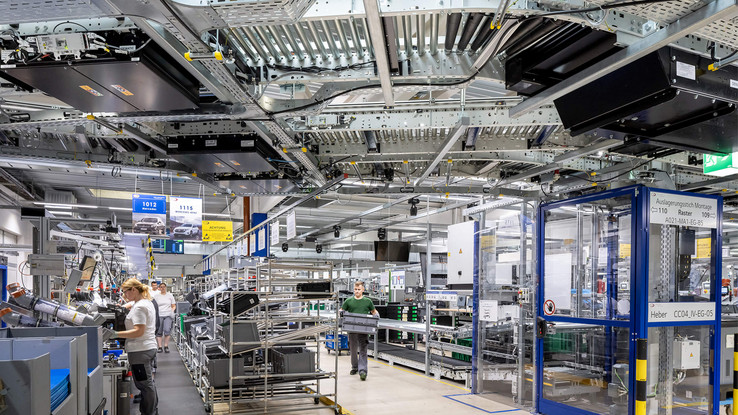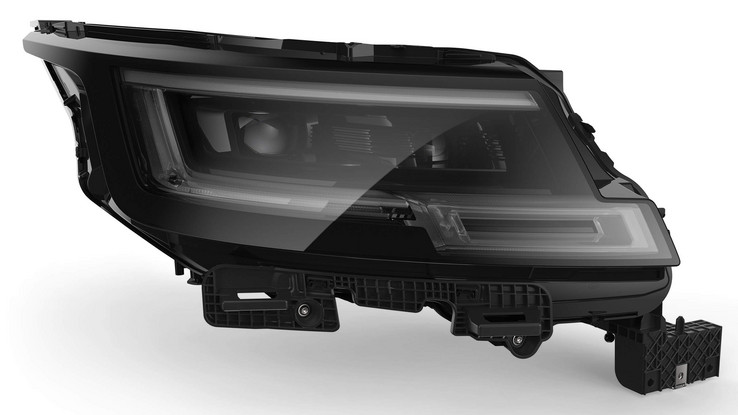Continuous, Standardised Change
The only constant is change
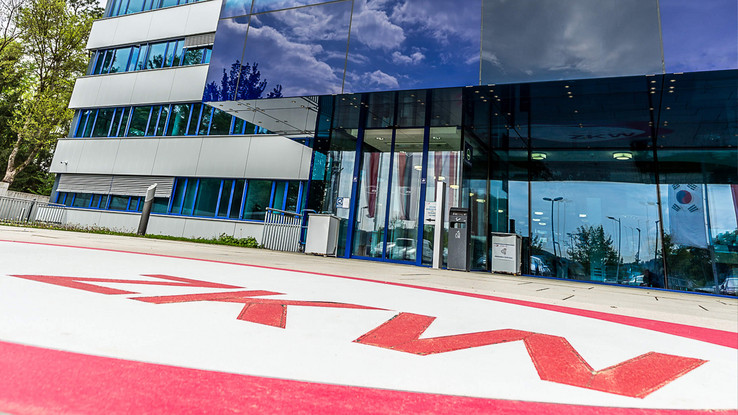
Premium lighting systems for the global automotive industry: the ZKW Group in Wieselburg, Austria.
© www.martingold.at
The only constant is change – at least that’s how production at ZKW is best described. This change poses great challenges for the company’s engineering department because the modular assembly lines must continually be adapted to produce new products time and again in an ongoing process. To achieve this high degree of flexibility in engineering, ZKW has recently started relying on EPLAN.
The ZKW Group, headquartered in Wieselburg, Austria, develops and produces premium lighting systems (including the electronics) for the global automobile industry. ZKW relies on a network of production facilities spread around the world and thus perfectly fulfils its customers’ high demands for quality and reliable delivery. Its Centre of Excellence for Research and Development, where the company develops and produces lighting systems, is located in Wieselburg, where it employs around 3,000 people (out of around 10,000 worldwide). Yet what initially may sound like simple headlights and taillights for cars and trucks actually turn out, upon closer inspection, to be highly sophisticated technical systems. These include, for instance, a 360-degree lighting system for a car, whose sensor and actuator systems will take on completely new and crucial significance as part of autonomous driving. ZKW is investing quite a lot of research and development into this future-oriented field and is therefore continually on the lookout for development engineers. A good example of one of these innovations is the novel DLP® LED headlamp, currently being installed on Range Rovers. Not only do these headlamps deliver progressive, anti-glare high beams that automatically adjust to keep from blinding oncoming vehicles and other road users, the smart, digital front lights also allow animated images to be projected onto the road.

Premium lighting systems for the global automotive industry: the ZKW Group in Wieselburg, Austria.
© www.martingold.at
The only constant is change – at least that’s how production at ZKW is best described. This change poses great challenges for the company’s engineering department because the modular assembly lines must continually be adapted to produce new products time and again in an ongoing process. To achieve this high degree of flexibility in engineering, ZKW has recently started relying on EPLAN.
The ZKW Group, headquartered in Wieselburg, Austria, develops and produces premium lighting systems (including the electronics) for the global automobile industry. ZKW relies on a network of production facilities spread around the world and thus perfectly fulfils its customers’ high demands for quality and reliable delivery. Its Centre of Excellence for Research and Development, where the company develops and produces lighting systems, is located in Wieselburg, where it employs around 3,000 people (out of around 10,000 worldwide). Yet what initially may sound like simple headlights and taillights for cars and trucks actually turn out, upon closer inspection, to be highly sophisticated technical systems. These include, for instance, a 360-degree lighting system for a car, whose sensor and actuator systems will take on completely new and crucial significance as part of autonomous driving. ZKW is investing quite a lot of research and development into this future-oriented field and is therefore continually on the lookout for development engineers. A good example of one of these innovations is the novel DLP® LED headlamp, currently being installed on Range Rovers. Not only do these headlamps deliver progressive, anti-glare high beams that automatically adjust to keep from blinding oncoming vehicles and other road users, the smart, digital front lights also allow animated images to be projected onto the road.
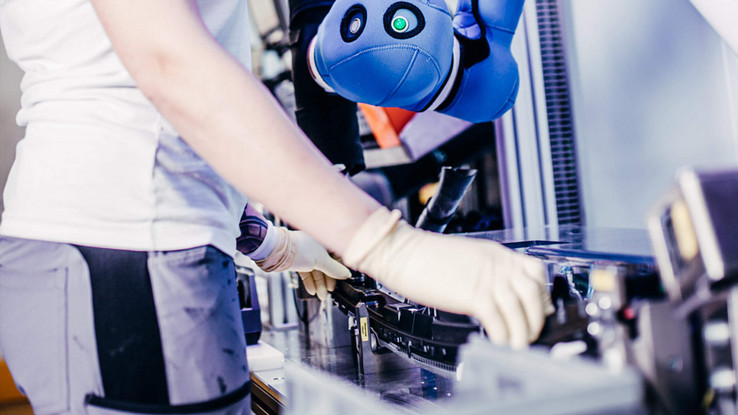
COBOTs – collaborative robots – work together with employees on the assembly lines.
© ZKW
Customise, convert, adapt
Of course, these and similarly innovative technologies place extreme demands on ZKW’s production facilities, requiring components such as delicate cameras, ultrasonic sensors and radar devices to be integrated into the headlights. “Furthermore, we test these systems and technologies from A to Z and back again before delivery,” says Engineer Alexander Klemenz, team leader for Process Engineering Operation Resources/Control Engineering at ZKW. “This places high demands on our in-house testing technology.” Clearly the company is operating in an innovation-driven market in which only the best survive. To ensure it remains competitive, the company invests a great deal of time and energy in its assembly lines. There are dozens of them in Wieselburg – it’s almost impossible to come up with an exact number since all the lines are subject to ongoing adaptation due to the tremendously high number of different lighting systems. To manage this complexity, ZKW has its own plant engineering department, which develops the assembly lines and testing technologies. Since 2019, ZWK has also been relying on COBOTs, collaborative robots that work alongside employees on the assembly lines. Klemenz says, “We must continuously adapt our complex, precise assembly lines for diverse and brand-new products and technologies, which involves a great deal of engineering work. However, we naturally want to keep these efforts to an absolute minimum.”

COBOTs – collaborative robots – work together with employees on the assembly lines.
© ZKW
Customise, convert, adapt
Of course, these and similarly innovative technologies place extreme demands on ZKW’s production facilities, requiring components such as delicate cameras, ultrasonic sensors and radar devices to be integrated into the headlights. “Furthermore, we test these systems and technologies from A to Z and back again before delivery,” says Engineer Alexander Klemenz, team leader for Process Engineering Operation Resources/Control Engineering at ZKW. “This places high demands on our in-house testing technology.” Clearly the company is operating in an innovation-driven market in which only the best survive. To ensure it remains competitive, the company invests a great deal of time and energy in its assembly lines. There are dozens of them in Wieselburg – it’s almost impossible to come up with an exact number since all the lines are subject to ongoing adaptation due to the tremendously high number of different lighting systems. To manage this complexity, ZKW has its own plant engineering department, which develops the assembly lines and testing technologies. Since 2019, ZWK has also been relying on COBOTs, collaborative robots that work alongside employees on the assembly lines. Klemenz says, “We must continuously adapt our complex, precise assembly lines for diverse and brand-new products and technologies, which involves a great deal of engineering work. However, we naturally want to keep these efforts to an absolute minimum.”
Design, standardise, automate
Since the previous engineering tool ZKW had used could no longer fulfil these requirements satisfactorily, the company began looking for a better solution – and found it with EPLAN. The engineering experts from Wieselburg have now been working for some time with EPLAN Pro Panel, which naturally includes EPLAN Electric P8, and can thus take advantage of a stable foundation for planning all the electrical parts of the assembly lines in 2D and 3D. This approach is also perfectly complemented by the cloud-based automation solution EPLAN eBUILD, which provides significant support for planning and documentation. “We’re strongly relying on as much standardisation and modularisation as possible on our assembly lines, not least to keep the time-to-market as short as possible,” Klemenz says. This is also reflected in the engineering department and “starts with fast product selection, moving on to accelerated design and time-optimised implementation.” Using EPLAN has been a perfect fit for ZKW: future changes to an assembly line can be easily and efficiently taken into account right from the start and, when the time comes, can be quickly and effortlessly implemented. “Thanks to eBuild, we also benefit from the automated creation of the schematics, which are always based on the same standards,” say Johannes Lagler and Reinhard Wurzer from ZKW Process Engineering Operation Resources/Control Engineering. And Lagler, Wurzer and Klemenz all agree: “This means we can save an enormous amount of time in engineering.” Incidentally, the introduction of EPLAN was accompanied by a significant adjustment to the internal structures in ZKW’s engineering department that proved very beneficial for making processes more transparent. Finally, Klemenz also can’t help but mention the EPLAN Data Portal: “It give us direct online access to high-quality product catalogues from a large number of prestigious component manufacturers. We can always access the necessary data and transfer components directly into the engineering process. For us, this is now an indispensable feature that EPLAN offers.”
Design, standardise, automate
Since the previous engineering tool ZKW had used could no longer fulfil these requirements satisfactorily, the company began looking for a better solution – and found it with EPLAN. The engineering experts from Wieselburg have now been working for some time with EPLAN Pro Panel, which naturally includes EPLAN Electric P8, and can thus take advantage of a stable foundation for planning all the electrical parts of the assembly lines in 2D and 3D. This approach is also perfectly complemented by the cloud-based automation solution EPLAN eBUILD, which provides significant support for planning and documentation. “We’re strongly relying on as much standardisation and modularisation as possible on our assembly lines, not least to keep the time-to-market as short as possible,” Klemenz says. This is also reflected in the engineering department and “starts with fast product selection, moving on to accelerated design and time-optimised implementation.” Using EPLAN has been a perfect fit for ZKW: future changes to an assembly line can be easily and efficiently taken into account right from the start and, when the time comes, can be quickly and effortlessly implemented. “Thanks to eBuild, we also benefit from the automated creation of the schematics, which are always based on the same standards,” say Johannes Lagler and Reinhard Wurzer from ZKW Process Engineering Operation Resources/Control Engineering. And Lagler, Wurzer and Klemenz all agree: “This means we can save an enormous amount of time in engineering.” Incidentally, the introduction of EPLAN was accompanied by a significant adjustment to the internal structures in ZKW’s engineering department that proved very beneficial for making processes more transparent. Finally, Klemenz also can’t help but mention the EPLAN Data Portal: “It give us direct online access to high-quality product catalogues from a large number of prestigious component manufacturers. We can always access the necessary data and transfer components directly into the engineering process. For us, this is now an indispensable feature that EPLAN offers.”
Switch, train, benefit
Many companies view switching from one software solution to a completely new one as a hurdle, or at least view it with a certain amount of trepidation. But these worries are often unfounded, as can be seen in this specific case. The first two words that come to mind for Lagler when he describes the process are “simple and straightforward” – even though the first steps with EPLAN took place in 2020, at the start of the corona pandemic. Lagler and EPLAN representatives worked together to define a concrete goal and then took a step-by-step approach to achieve it. “Experienced EPLAN employees, who had specifically prepared for our situation and also for the more difficult conditions, actually made the start very easy for us, which resulted in a smooth changeover.” Individually customised courses and trainings – initially online due to the pandemic, then later on-site at ZKW – perfectly complemented the offerings. As Lagler likes to emphasise: “We have always had the same contact person at EPLAN, who is familiar with us and our concerns. We really appreciate that.”
Switch, train, benefit
Many companies view switching from one software solution to a completely new one as a hurdle, or at least view it with a certain amount of trepidation. But these worries are often unfounded, as can be seen in this specific case. The first two words that come to mind for Lagler when he describes the process are “simple and straightforward” – even though the first steps with EPLAN took place in 2020, at the start of the corona pandemic. Lagler and EPLAN representatives worked together to define a concrete goal and then took a step-by-step approach to achieve it. “Experienced EPLAN employees, who had specifically prepared for our situation and also for the more difficult conditions, actually made the start very easy for us, which resulted in a smooth changeover.” Individually customised courses and trainings – initially online due to the pandemic, then later on-site at ZKW – perfectly complemented the offerings. As Lagler likes to emphasise: “We have always had the same contact person at EPLAN, who is familiar with us and our concerns. We really appreciate that.”
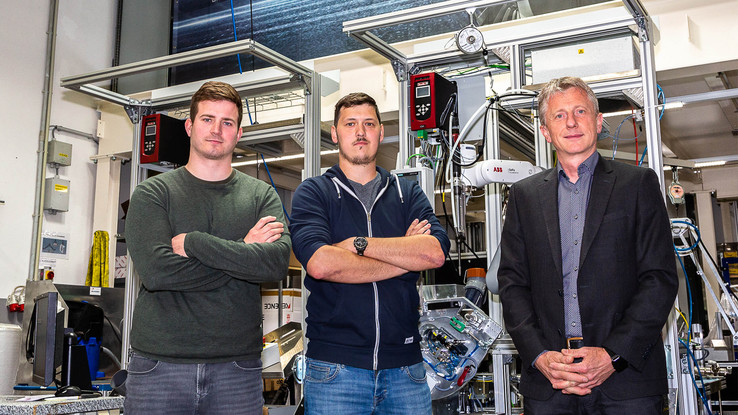
“We’re more flexible and faster with EPLAN.” From left: Alexander Klemenz, Johannes Lagler (both ZKW) and Erwin Kreuzer (EPLAN).
© www.martingold.at

The introduction of the EPLAN software solutions at ZKW went off without a hitch thanks to optimal support.
© www.martingold.at
Author: EngineerMartin Gold: journalist, writer and photographer, Vienna

“We’re more flexible and faster with EPLAN.” From left: Alexander Klemenz, Johannes Lagler (both ZKW) and Erwin Kreuzer (EPLAN).
© www.martingold.at

The introduction of the EPLAN software solutions at ZKW went off without a hitch thanks to optimal support.
© www.martingold.at
Author: EngineerMartin Gold: journalist, writer and photographer, Vienna



